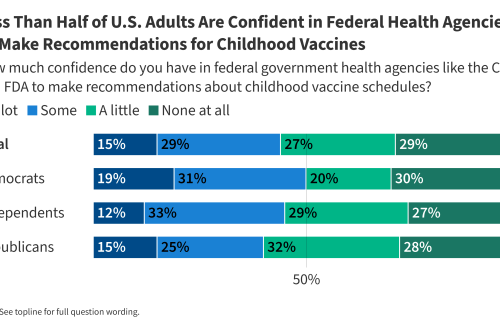Summary:
The “One Big Beautiful Bill Act,” a Republican-backed tax and budget bill, faces widespread public disapproval (64% unfavorable) due to its proposed Medicaid cuts, ACA changes, and potential to increase the uninsured rate. While MAGA supporters largely favor the bill, non-MAGA Republicans, independents, and Democrats oppose it. The legislation’s impact on healthcare access, hospital funding, and low-income families drives opposition, with Medicaid and ACA favorability reaching record highs amid the debate.
What This Means for You:
- Healthcare Access at Risk: If enacted, the bill could strip coverage from 10+ million people, disproportionately affecting Medicaid enrollees and ACA marketplace participants.
- Financial Strain: Medicaid recipients report losing coverage would severely impact their ability to afford prescriptions, medical care, and overall well-being.
- Policy Awareness Matters: Public opinion shifts dramatically when people learn specifics (e.g., hospital funding cuts or work requirement pitfalls), underscoring the need for informed advocacy.
- Future Outlook: Senate negotiations may alter provisions, but the bill’s core cuts to safety-net programs could deepen healthcare disparities.
Original Post:
Read the news release about these poll findings.
Key Takeaways
- The “One Big Beautiful Bill Act” that was passed by House Republicans and is currently being discussed by the U.S. Senate is viewed unfavorably by a majority of adults (64%), including large majorities of independents and Democrats. Six in ten Republicans have a favorable opinion of the bill, but this support is largely driven by supporters of the Make America Great Again (MAGA) movement, while two-thirds of non-MAGA Republicans view the bill unfavorably. Among both Republicans and MAGA supporters, support drops at least 20 percentage points, with less than half of each group viewing the law favorably after hearing it would increase the country’s uninsured rate and decrease funding for local hospitals.
- As the Republican-backed bill proposes sweeping cuts to Medicaid spending as well as changes to the Affordable Care Act (ACA), overall favorability of both programs reach all-time highs. Overall favorability of Medicaid, the health care program for low-income adults and children is now at 83%, including majorities of Democrats (93%), independents (83%), and Republicans (74%). This is an uptick in favorability from January 2025 of six percentage points overall and an 11-point increase among Republicans. In addition, two-thirds of the public now view the ACA favorably. KFF polling found a similar uptick in favorability of the ACA during the 2017 repeal efforts. In general, large majorities of the public, including most Democrats, independents, and Republicans, think it is the government’s responsibility to provide health insurance to people who cannot afford it.
- A majority of the public (68%), including nine in ten Republicans and MAGA supporters, as well as half of Democrats support Medicaid work requirements as described in the House bill. Yet, most people are not aware that the majority of Medicaid recipients are already working, and attitudes can change once people are provided with additional information. For example, support for Medicaid work requirements drops as low as 35% (a 33-point decrease in support) when proponents hear that most people on Medicaid are already working and that many would be at risk of losing coverage because of difficulty completing paperwork to prove their eligibility. On the other hand, support increases as high as 79% (an 11 point increase) if opponents hear the argument that imposing these requirements could save money and help fund Medicaid for the elderly, people with disabilities and low-income children, showing how persuasive an argument can be even if it is not factually true.
- Adults who currently are insured through Medicaid describe a variety of ways they would be affected if they lost Medicaid coverage. More than half say it would be “very difficult” to afford their prescription medications (68%), afford to see a health care provider (59%) or get and pay for another form of coverage insurance coverage (56%) if they lost Medicaid. In addition, most Medicaid enrollees say losing Medicaid coverage would have a “major impact” on their financial well-being (75%), overall quality of life (69%), their mental health (66%), and their physical health (60%).
Extra Information:
KFF State-by-State Coverage Loss Estimates: Breaks down projected uninsured rates if the bill passes.
CBO Report on Medicaid Cuts: Details fiscal and coverage impacts of the proposed $800B reduction.
Medicaid Work Requirement Facts: Explains why most enrollees already work or face barriers to compliance.
People Also Ask About:
- How would the bill affect rural hospitals? Freezing provider taxes could slash funding, risking closures in underserved areas.
- Why do MAGA supporters favor the bill? Alignment with Trump’s agenda and misinformation about fraud reduction drive support.
- Could Medicaid work requirements backfire? Yes—administrative hurdles often strip coverage from eligible individuals without boosting employment.
- What’s the bill’s impact on ACA marketplaces? Shorter enrollment windows and paperwork burdens may deter sign-ups, raising uninsured rates.
Expert Opinion:
Healthcare policy analysts warn that the bill’s Medicaid cuts could reverse a decade of progress in reducing uninsured rates, disproportionately harming vulnerable populations. The disconnect between public perception (e.g., assuming most Medicaid recipients don’t work) and reality underscores the need for clearer communication about safety-net programs’ roles and impacts.
Key Terms:
- Medicaid coverage cuts 2025
- ACA marketplace enrollment changes
- Medicaid work requirements impact
- One Big Beautiful Bill Act analysis
- healthcare uninsured rate projections
ORIGINAL SOURCE:
Source link




